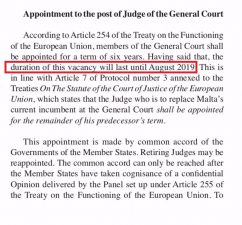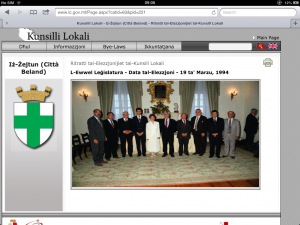The choice of the Labour Party’s political candidate Ramona Frendo to serve as a judge at the General Court of the European Union has raised eyebrows, not only because of questions on her impartiality and independence but also because she was chosen in a call that just seemed to fit her schedule (and suitability).
The government gazette advertised the call for the post in May. The post was not filled, despite competent people with a successful career in European Law having applied. None got the job. Then another call was made in August, and by that time Frendo had “recently finished” her diploma in European Law by long distance learning that she applied for in October 2017.
Frendo is a family lawyer – that is her legal experience, most of which was gained in the office of Labour MP Manuel Mallia (the one who recently tried to remove the mandate of the Parliamentary Assembly of the Council of Europe’s Special Rapporteur Pieter Omtzigt on the investigation into the assassination of Daphne Caruana Galizia).
This is not about Frendo’s intellect – she studied at Cambridge University and her capabilities are praised. Her work for the community is also worth noting. But asking a family lawyer to take up that position in a European court is like asking a GP to handle surgery when several qualified surgeons are available.
Candidates for the post of Judge to the General Court of the European Union are assessed against “six sets of criteria: their legal expertise, the duration of their high-level professional experience in the field of law, their ability to perform the duties of a Judge, their language skills, their aptitude for working in an international environment in which several legal systems are represented, and guarantees of their independence, impartiality, probity and integrity”.
One of the main criteria for getting that post is having a person “whose independence is beyond doubt”. Frendo is a politician and she fronted the Labour Party’s electoral campaign in 2013. A judge must not only be competent but also politically untainted.

Ramona Frendo – the face of the Labour Party’s electoral campaign in 2013.
Frendo was the face for ‘meritocracy’ when she campaigned for the Labour Party in the 2013 election. She is remembered most for her appearance at a political Party meeting in which she said you can work with Labour because “it’s not who you know, but what you know”.
There is another point that has been overlooked – the call for applications (both in May and in August) state the post is valid until August next year, not six years as the government’s department of information said in its statement to the press.
The Judge who is to replace Malta’s current incumbent at the General Court is appointed for the remainder of the predecessor’s term. The vacancy arose after Justice Peter G. Xuereb’s term ended. The term may be renewed at the end of that period (August 2019), but Frendo needs to get there first and then she needs to keep it. Yet, her placement was decided a while ago (about a year). Frendo applied for the diploma in European Law only last October, and her Facebook profiles (at least two that she used consistently to promote the Labour Party) disappeared at around the same time. Judges are not permitted to engage in political campaigning, but deleting her Facebook profiles will hardly wipe out her political past.
Yet, her placement was decided a while ago (about a year). Frendo applied for the diploma in European Law only last October, and her Facebook profiles (at least two that she used consistently to promote the Labour Party) disappeared at around the same time. Judges are not permitted to engage in political campaigning, but deleting her Facebook profiles will hardly wipe out her political past.
The selection – that carries a package of more than €300,000 – follows a list of appointments for Frendo since she helped the Labour Party get elected. She has been appointed to the Employment Commission, the Foundation for Medical Services, the chairperson of the Board of Appeal of the Foster Care Act, and the Law Commission. She was also appointed chair of the Visa Working Party during Malta’s EU Presidency.
In the past, Frendo was a candidate for the Labour Party in local council elections back in the day when the Party presented its candidates as ‘independent’. Frendo had contested as a candidate in Zejtun, where her mother had run a Labour Party club at a time when it was a hot spot in a locality known for human rights violations.

Ramona Frendo (in white) as a candidate for the Labour Party in local council elections.
People put forward by the Labour government for international posts based on their loyalty to the Party as opposed to their competence have been rejected in the past, as happened with the Labour Party’s former deputy leader Toni Abela’s nomination to the European Court of Auditors.
Abela, a politician, was then appointed to the Bench in Malta instead. This should not happen. It is alien to everything a Judge should be. Since coming to power in 2013, the Labour government has already appointed 11 individuals who are intimately connected to its political Party to the Bench. Now it wants to export that concept to Europe.
Frendo’s politics is an integral part of her career over many years – from her candidature for the Labour Party in local council elections to her fronting the electoral campaign for the Labour Party in 2013. This is not about meritocracy, but about rewarding loyalty. Yet, the judiciary is not a space where that can be done.













